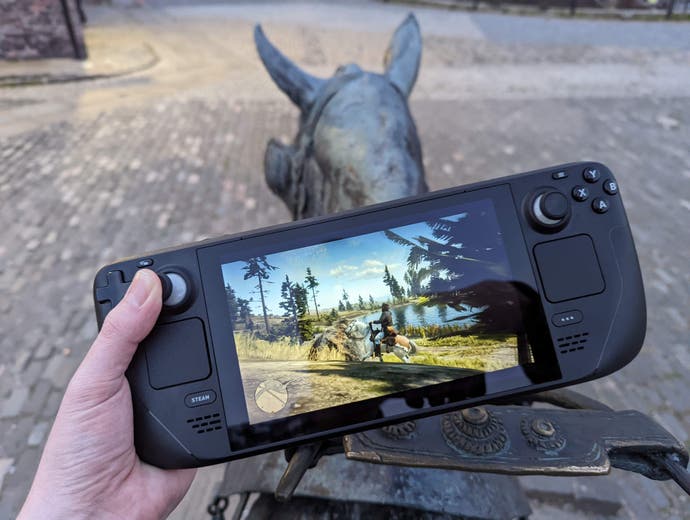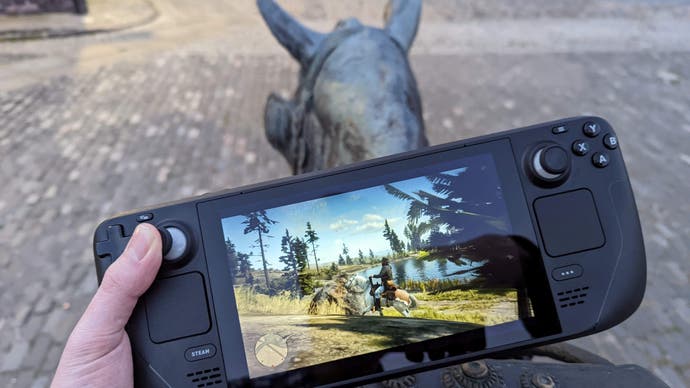The Steam Deck redefines your relationship with your PC library
Maximus Deckimus.
There's a game in my Steam library called Ryse: Son of Rome and I'm not sure how it got there. It's been lurking for years, building itself a nest in the midden-heap of discarded indie games. I've never played it. I don't think I even bought it. Not deliberately. Probably it hitched a ride with a charity bundle, but I like to think it snuck in by itself. I bring this up because I recently saw a forum post by someone who reached for their Steam Deck one day and, completely unbidden, played Ryse from start to finish. They'd had fun, but sounded bewildered, like they'd woken up after a heavy night out and were trying to account for some questionable choices. I couldn't understand it either. Our little lives are rounded with sleep, and surely there are too few precious hours for a middling 2013 hack-n-slash. But, having had my own Steam Deck for over a week now, I think I get it.
The Steam Deck is Valve's most recent – and most competent – foray into PC hardware. It's a big, burly, Switch-looking handheld, which promises PC gaming on the go. It delivers in spades. Since it started shipping earlier this year, people have been putting it through its paces, feeding it Cyberpunks and Flight Simulators and watching the custom AMD processor work magic.
And it really is magic. Although the software has a few kinks, plonking the Steam Deck in your lap and booting Elden Ring feels like a childhood daydream come true. What surprised me most, though, is that raw horsepower is only part of the magic. The Steam Deck has redefined my relationship with my Steam library. Let me tell you.

Obviously, there's the portability. Like the Switch before it, the Steam Deck cuts some of the restraints tethering you to your chair. Suddenly you can play PC-bound games in bed or lounging on the sofa. You can play Vampire Survivors at the breakfast table, or Phantom Pain on the loo. If you're so inclined, you can even venture outside the house. It's liberating. And, although the Deck is 50 percent heavier than Nintendo's Switch, it doesn't feel that way. Through some ergonomic wizardry it seems to float as you hoist it from room to room.
But that's not all, I think. I've found gaming on the Deck more focused than at the desk.
If you're anything like me, you do a lot of your gaming sitting at a PC. After a long day at work or school you wedge yourself into the chair and boot up whatever you have on the go. But sometimes you sit down and realise two hours later that you've done nothing but scroll reddit. Or, worse, you open a game but feel the gravitational pull of Twitter tugging your forebrain. Rather than fully engaging, you're fighting the impulse to check your notifications, or the news, or Eurogamer. With games that grab your whole attention - Soulslikes, Roguelikes and the like - this is no great issue. But for less intense genres like, oh, let's say walking simulators, it's anathema.
Okay, buying a new console just so you can't Alt-Tab onto Twitter might be overkill. But the difference is profound. It's rekindled that childhood feeling of just sitting and playing. The nearly nirvana flow state where worldly cares recede and you're fixed in the moment.

More than that, though, some games just hit different on handheld. Take Death Stranding. It's a strong flavour: chill, rainy mood, craggy mountain vistas, interspersed with viscerally unhinged sci-fi body-horror. I wasn't loving it on desktop, but it's weirdly well-suited to handheld play. I'm not talking about the mossy Icelandic landscapes. They deserve as many pixels as you can throw at them. I mean the gameplay itself. The little mountain hiking trips are brief and self-contained. They're perfect for a quick play session. And when you've had your fill of Kojima nonsense – too many closeups of Norman Reedus' nostrils or something – the 'system suspend' button is mercifully in finger's reach.
There are some other standouts. Once you escape the 2K game launcher, Civ 6 is great on the go and, unlike the Switch version, doesn't freeze for minutes between turns. Puzzler's like Patrick's Parabox are fab in short bursts. Hitman's sandboxes are great for faffing around with TV on in the background. And Forza 5's short road-races work splendidly on the bus.

Forza 4 would be great too only, despite using the same game engine, right now it's unsupported. But I guess the final thrill of the Steam Deck is figuring out what works and what doesn't.
Currently, over half the games in the Steam catalogue are untested. They might run on Steam's Proton compatibility layer, they might not, and no one's yet had time to formally check. This brings an element of surprise. Alongside the new user interface, it shines a light into the dustier corners of your Steam Library. You go treasure diving, swimming past the decaying hulks of long-forgotten games, winching them to the surface and seeing if you can get them going. And often they sputter to life. I dredged up Marvel vs Capcom 3 - works a charm, still a classic. I finally started Supergiant's Pyre - as lush and colourful on the Deck's small screen as it is on desktop. If I can find time, I'll play Trials of Cold Steel, a port of a niche PS3 JRPG which, against all odds, runs flawlessly.
Of course there are frictions. Valve have created a machine to play almost two decades of games built for multiple platforms and multiple input methods. Some straight up don't work. The fiddly touch pads are no substitute for a proper mouse, and there are plenty of glitches and crashes and games with tiny, tiny text. Also, the fan whines like a jet engine. But, for all these faults, the Steam Deck has redefined my relationship with PC gaming. Providing you can get your hands on one – waiting lists are months long and they're still not available outside Europe and North America – you'll see your PC library in a new light. Even if you have a decent desktop, this alone could be worth the price of admission. Just don't be surprised if you find yourself playing Ryse: Son of Rome.
